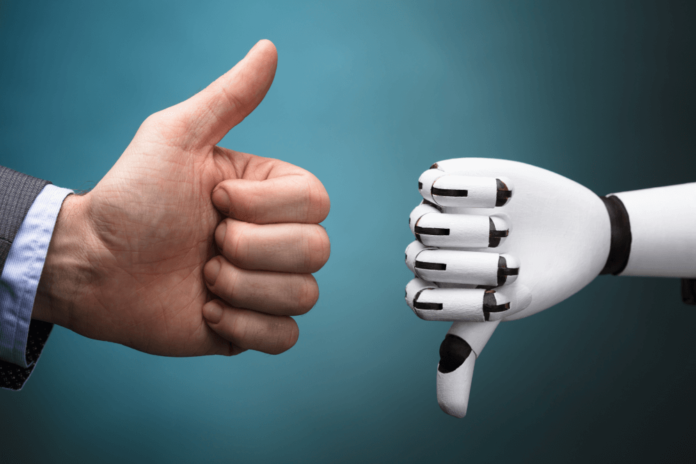Nowadays, everybody is talking about ChatGPT – the newest and shiniest “toy”, a revolutionary technology, which promises to make the life easier in many professional fields, but which, at the same time, represents a big threat. It is foreseen that the artificial intelligence will completely replace jobs from different domains, which are currently done by human beings, and this is because AI can do things faster and much cheaper.
How it will change the online environment, how much it “steals” from the attention of users and from the position comfortably occupied by Google and what will be the long-term impact on the online marketing industry in Romania, remains to be seen, however, as always, there is a balance between advantages and disadvantages, and the first ones to benefit of this new technology will be one step ahead of their competitors.
However, every time a new technology appears that produces major, “disruptive” transformations, there is also danger that can seriously unbalance budgets, results and even the brand image, of which any business with an online presence should be aware.
“The good” – The positive aspects of AI technology
Perhaps the most attractive feature is related to content generation. The new OpenAI chatbot can write articles, essays, jokes, and even poems in response to users’ requests. ChatGPT surpasses human capacity for content generation, both in terms of quantity and speed, and can provide simple answers to complex topics without blocking due to the lack of creativity. ChatGPT is not the only technology based on NLP (natural language processing) and content generation; there are many other AI tools such as Jasper AI, Writer.com, Headlime, and so on.
Moreover, it can generate ideas for those who do not know where to start, create content calendars for social media, and even content for newsletters or send direct sales emails to customers.
Apart from NLP and content generation, AI-based technology has been used for some time now in:
- Data analysis. It collects and analyzes large amounts of marketing data from various campaigns and platforms, which would otherwise have to be sorted manually.
- Paid advertising, or more exactly – media buying. AI can choose the most effective distribution channels, from both online and traditional media (TV, radio, print) to reach the target audience and maximize the benefits of investing in marketing strategies
- Automated decisions. AI marketing tools can make inspired decisions regarding your marketing and business growth strategies, based on previous internal or external data.
- Real-time personalization. It can modify in real-time a customer’s experience, such as a website page, social media post, or email, to match the customer’s previous preferences and encourage a specific action, such as clicking on a link, signing up for a webinar, or purchasing a product.
From the category of free tools, grammar checking tools are excellent, and among the paid ones, those that can extract real-time data from your competitors’ websites, which detect and observe any changes on various sites, including changes in price or the ones that can download text, links, and images, are really helpful in monitoring your competitors.
Entrepreneurs from different fields and many digital marketing agencies consider AI marketing tools to be particularly effective when they are integrated into their existing marketing strategy, rather than being used as a standalone tactic. These tools create opportunities for optimization and speeding up the steps of marketing strategies that require additional labor, such as data analysis, or that pose risks of inaccuracy, such as attribution.
“The Bad” – The negative aspects to consider
- You have to be very selective when using it. The GPT-3 application provides good results, but it is far from perfect. Even the most popular chatbot used for content generation, ChatGPT, does not respond to every query because it does not have the necessary data. There are many topics for which it cannot write concrete details, but only trivialities and generalizations. Its harshest critics accuse it of superficiality and redundancy.
- You have to check absolutely everything and not rely on the authenticity of the data. The biggest problem with AI-generated content is that it lies. But the worst part is that it does not give you any clue when it lies. Why does this happen? There is no data verification mechanism within GPT-3, and there probably will never be, due to the exorbitant costs of testing the correctness of each of the billions of requests received. It often relies on incorrect data sources and is designed to write at any cost. Even when there is limited data on a subject, ChatGPT will continue to generate content with enthusiasm, regardless of its correctness.
Also, the current rate of “hallucinations” emitted by ChatGPT is somewhere around 15-20%. The internet is full of hallucinations emitted by OpenAI’s chatbot on various topics, the most recent ones being the record for crossing the English Channel on foot or the opinion essay about mayonnaise racism. Artificial hallucinations represent a response created by AI, which does not seem to be justified by its training data, but which still appears when it tends to misinterpret the information it holds.
- It does not generate that “personal touch”. The quality of content is differentiated by its ability to bring something new and unique to any subject: original data, a useful opinion, practical experience, or the friendliest explanatory framework. AI-generated content functions as a cheater, creating new articles based on existing ones, and the interesting ideas are rare and hidden among other 50 uninteresting and sometimes completely meaningless statements.
- It does not excel in terms of logical structure. It can emit entire paragraphs of text, but they can often be difficult for a reader to follow because there is no overall picture to dictate the narrative line.
I have noticed that the tool has real problems when:
- it needs to refer to certain brands or products. The correct content is usually only general.
- it generates conclusions about subjects that have been seriously changed or updated since 2019 to the present.
- it needs to provide you with more concrete data. Any article that requires a multitude of data will be populated by AI with outdated or completely false statistics, as they are effectively “manufactured”.
The latest scandal is related to the articles which were entirely written by artificial intelligence by the publications “Sports Illustrated” and “Men’s Journal”, which announced that they will start publishing AI-generated articles, assuring readers that this practice will not lead to a decrease in the quality of the provided information.
The first article of this kind published in “Men’s Journal” is entitled “What Every Man Should Know About A Low Testosterone Level” and it issued a lot of medical statements, nutritional and lifestyle advice, and even suggested a specific medical treatment, in the form of testosterone replacement therapy, all targeted to readers who were seeking guidance on a serious health issue. Like most AI-generated content, the article was written with the confident authority of a real expert. It presented quotes with an academic appearance, and additional credibility came from a note stating that the information was “reviewed and checked by the editorial team”.
But upon a closer inspection, everything fell apart. Dr. Bradley Anawalt, a medical doctor and director of the University of Washington Medical Center, who held several leadership positions at the American Society of Endocrinology, reviewed the article and said it contained 18 basic errors and completely erroneous characterizations that gave readers a deeply distorted understanding of this health issue. After receiving this criticism, the publication completely rewrote the article, correcting the mistakes.
The journalists from “Men’s Journal” are not the only ones, as in January 2023, the well-known website CNET, specialized in news about technology, published dozens of AI-generated articles about personal finance management. These contained either major errors, plagiarism or both.
Publishing incorrect information can have serious long-term consequences because Google is very strict about it and has just published new rules regarding AI-generated content, which targets spam, incorrect, or misleading content. Google’s algorithm rewards original, quality content that follows the E-A-T principle: expertise, authoritativeness, and trustworthiness, which Google uses in ranking its organic results.
As the internet is full of questionable quality content written by real people just to deceive search engines, in an attempt to reach the first page, Google will take care to penalize websites that try to fill the online environment with AI-generated articles that are just as bad, because it can detect it and has been doing this so for years. With the help of its algorithms, it can check how well any type of content is written, identifying various inconsistencies and patterns that usually appear in AI-generated content. It looks for sentences that make no sense to human readers but which only contain keywords, and also checks content generated by patterns and stochastic sequences, such as the Markov chains.
Google also checks content generated through RSS feeds from different web pages, and any that do not add any tangible value are detected and marked as such. Moreover, general, superficial, and confusing content or which is rewritten through paraphrasing and by replacing certain words with synonyms is easily detectable by Google.
Furthermore, OpenAI announced in January 2023 that all content generated by ChatGPT will soon be “watermarked,” meaning it will be detectable thanks to a cryptographic tool that supports Google. This measure was communicated as an important step in stopping the useage of their tool with a negative purpose.
On the other hand, because they are aware of their own limitations and want to maintain the growth rate of ChatGPT’s usage and attract as many paying customers as possible for its pro version, which can obtain satisfactory results in the online, including organic results, this move is predictable.
“The Ugly” – Dangers to Beware Of
The ugliest part, whenever such a useful free tool appears, is that opportunists emerge. For example if you have a business, when you hire a freelancer or a marketing agency, you expect to pay for the expertise of specialists, and for example, not for content that is generated entirely by artificial intelligence, which is not even reviewed or checked.
The Romanian internet is already full of product and service descriptions and articles that are either completely copied or even created by using Google Translate, which are therefore banal, lacking in originality and creative effort; so if you have had negative experiences in the past, the content which is generated by OpenAI’s chatbot can create a positive first impression, especially if you do not have enough experience in the field and do not know what an article, description, newsletter, or valuable social media post should look like.
A world, in which the generated content by ChatGPT is the standard, is a world without any difference in quality and a world with homogenized content. It is not a world that excels in extraordinary content because any journalist or copywriter surpasses ChatGPT by far, or at least for now. When multiple competitors in the same niche generate articles on the same topic using the same AI tool, differentiation disappears completely. In this case, you will need to outperform your competitors using other SEO tools, such as link building and technical SEO, both of which are much less important for ranking on the first page of Google compared to content marketing.
How can you protect your online business? Just as any type of external content needs to be tested before publishing through a plagiarism checker (there are dozens of free online options available) to ensure that you protect your reputation, the GPTZero application is very useful in detecting AI-generated content. Moreover, any online marketing agency or specialist will ask specific questions and personalize the content created. You should refuse any form of content that says a lot without basically saying anything, which can be used by any other competitor with minimal modifications. In this situation, service contracts in the online marketing field should also cover these new dangers.
Moreover, there is another perspective that is not discussed enough. As a business person, would you agree that your website to be used by ChatGPT to generate free content, and then it to be delivered to your competitors? Large language models like ChatGPT use multiple sources of information and web content: books, articles, websites, and social media posts, including personal information obtained without consent. Many of the conclusions, which are being used in ChatGPT responses, may be yours.
All this data forms the basis of the generated content, which is produced without any attribution or benefits for those who have published the original content, sometimes even if it is protected by copyright. Currently, the company is valued at over $29 billion, double – compared to 2021, without any form of compensation to any person or company for the content which was used to train ChatGPT.
As a result, many companies have started to protect their content by blocking certain crawlers. If your website has already been accessed, then your website data base is stored and there is currently no way to remove it from Common Crawl or any of the other derived datasets, such as C4 and Open Data.
Moreover, when becoming users of their platform, no one is asked if OpenAI can use their data. This is a clear violation of privacy, especially when the data is sensitive. Additionally, OpenAI does not provide any procedure for individuals to verify if their personal information is stored or to request its deletion. This is a right which is guaranteed by GDPR and it is still debated whether ChatGPT complies with these requirements or not.
Instead of hiring people to interact with customers, companies will increasingly rely on AIs like ChatGPT to calm angry customers with intelligent and reassuring words. This means fewer jobs for beginners and fewer opportunities to start a career.
And customers will also suffer. Chatbots can be a solution for managing routine, general questions, but it is not the routine questions that generally prompt people to call customer service. When there is a real problem, you want to talk to a well-qualified, empathetic professional with the ability to organize resources and offer solutions in real time. You do not want to be put on hold for eight hours and you do not want to talk to an eloquent chatbot that ultimately proves useless.
The Romanian retailer Emag chose this solution last autumn, giving up its call center services and replacing them with a rather limited interactive chat version, which sparked harsh discussions in the online from dissatisfied customers. However, it is to be seen if it is going to have any effects on a long term, as for the moment, at least, Emag remains firmly on its position as an absolute leader of Romanian e-commerce.
Over a century ago, Henry Ford revolutionized car production by heavily investing in new electrical equipment and developing a more efficient assembly line. These new technologies brought some automation, as centralized sources of electricity allowed equipment to perform more tasks more efficiently. But the factory reorganization, that accompanied the introduction of this innovation in production, also created new tasks for workers and thousands of new jobs with higher salaries, contributing to common prosperity. Ford paved the way with proving that technology, which is completed and supervised by human beings, is a good business.
In conclusion, ChatGPT is a tool like any other. It can be useful in some cases, completely useless in others, appreciated by enthusiasts, or even rejected by cynics. Marketing specialists have a responsibility to explore, understand, and use any tool they can use in the interest of their clients, as a multiplier of their creative power. However, no respectable specialist or agency will deliver something based exclusively on the OpenAI chatbot, in which the human contribution is zero.
Even if it replaces repetitive jobs and positions that do not require much creativity and intelligence, the artificial intelligence cannot reach the same level of performance as a person, because it cannot self-adjust like the human mind does.
Anca Dobrescu, Managing Partner, PePrimaPagina.ro






























